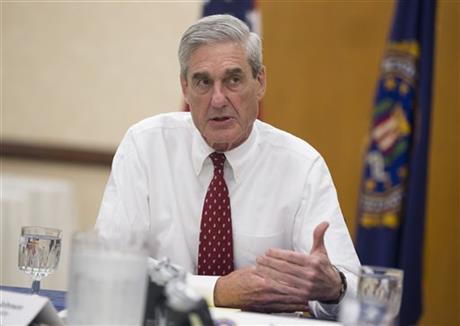
By PETE YOST
Outgoing FBI director Robert Mueller speaks during an interview at FBI headquarters on Wednesday, Aug. 21, 2013, in Washington. The nature of terrorism has changed in Robert Mueller’s dozen years as FBI director, but his concerns for the future are much the same as when terrorists struck on Sept. 11, 2001, merely a week after he’d taken over the bureau. (AP Photo/Evan Vucci)
WASHINGTON (AP) — The nature of terrorism has changed in Robert Mueller’s dozen years as FBI director, but his concerns for the future are much the same as when terrorists struck on Sept. 11, 2001, merely a week after he’d taken over the bureau. As he wraps up his FBI tenure, Mueller worries that terrorists will once again target planes or finally pull off an attack using a weapon of mass destruction.
Mueller sees terrorism as a shifting landscape, evolving from Osama bin Laden’s global brand in the aftermath of the Sept. 11 attacks to the splintering threats arising in the fallout from the Arab Spring across the Middle East.
“Every one of these countries now has cadres of individuals who you would put in the category of extremists, violent extremists, and that will present threats down the road,” Mueller said.
Mueller, the architect of the bureau’s transformation into a terrorism-fighting agency, spoke to reporters Wednesday at FBI headquarters.
The director’s last day on the job is Sept. 4. His successor, former Justice Department official James Comey, will be on hand next week for the transition.
During Mueller’s tenure, terrorists were thwarted in their efforts to bring down a trans-Atlantic flight in 2001, a Detroit-bound jetliner on Christmas in 2009 and U.S.-bound cargo planes carrying printer cartridge bombs. But the Boston Marathon bombings that killed three people and injured hundreds in April and the 2009 shooting that killed 13 and injured more than 30 at Fort Hood, Texas, are powerful reminders that the protective net against terrorism is not infallible.
“I always say my biggest worry is … an attack on a plane,” Mueller said. “And secondly, it’s a weapon of mass destruction in the hands of a terrorist and that includes a cyber-capability that trumps the defenses that we have.”
He also sees the risk of a cyberattack on a financial institution or on a sector such as energy “where we do not have sufficient barricades or preventive capabilities.”
Mueller’s initial foray into the world of counter-terrorism came more than two decades ago with the attack on Pan Am Flight 103, which was blown up over Scotland in 1988.
“I spent lot of time on that investigation over at the Department of Justice” and “still spend time with the survivors of that horrible, horrible disaster,” said the director.
As he has in recent congressional testimony, Mueller defended the National Security Agency’s classified surveillance programs.
“I am fairly comfortable and confident that we are doing things the way the American public would expect us to,” said Mueller. He said the NSA programs are “tremendously important to the protection, not only from terrorist attacks, but from other threats to the United States.”
Regarding the disclosures of classified information by former NSA systems analyst Edward Snowden, Mueller said “they have impacted” criminal investigations and are “in the process of impacting capabilities around the world.” He declined to give any details.
Mueller made the comments the same day that a new round of revelations about the surveillance showed that the NSA scooped up as many as 56,000 emails and other communications annually over three years by Americans not connected to terrorism. He spoke to reporters before those details were made public.
In the interview, he declined to comment on prospects that Congress might restrict the surveillance programs or require greater disclosure about the details of the programs.
Looking back, Mueller says he didn’t expect to be focused on terrorism when he took the job that has consumed the past 12 years of his life in law enforcement.
Mueller says he thought he would be overseeing the kinds of cases he had worked on as a federal prosecutor — organized crime, narcotics, public corruption and white-collar crime.
“I had in my own mind some ideas about where the bureau needed to go and then a week later we had Sept. 11,” Mueller said. “I did not expect I would be spending my time preventing terrorist attacks.” For the FBI, “it’s not what we want to do, or like doing, it’s what the American public expects us to do.”
The FBI often succeeded in that goal but not always.
“I would say you feel the most pain from what happened at some place like Fort Hood or what happened up in Boston,” Mueller said. “That’s not to say that you could have prevented it, that’s speculation. But the fact of the matter is, you sit down with victims’ families, you see the pain they go through and you always wonder whether there isn’t something more” that could have been done.



